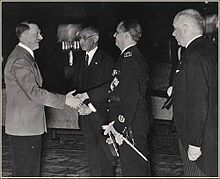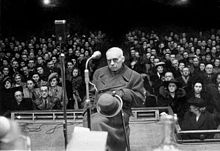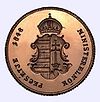- Döme Sztójay
-
Döme Sztójay 
Prime Minister of the Kingdom of Hungary In office
22 March 1944 – 29 August 1944
(0 years, 160 days)Preceded by Miklós Kállay Succeeded by Géza Lakatos Personal details Born January 5, 1883
Versec (Serbian: Vršac), Temes County, Kingdom of Hungary, Austria-Hungary (today Serbia)Died August 22, 1946 (aged 63)
Budapest, HungaryNationality Hungarian Political party Independent Spouse(s) Jozefa Landgráf Profession politician, diplomat Döme Sztójay born Demeter Sztojakovich (Serbian: Dimitrije Stojaković, Serbian Cyrillic: Димитрије Стојаковић, January 5, 1883 – August 22, 1946) was a Hungarian soldier and diplomat of Serb origin, who served as Prime Minister of Hungary during World War II.
Biography
 Hitler and the Hungarian delegation in 1939, Berlin: Prime Minister Count Pál Teleki, Minister of Foreign Affairs István Csáky and Hungarian Ambassador to Germany Döme Sztójay
Hitler and the Hungarian delegation in 1939, Berlin: Prime Minister Count Pál Teleki, Minister of Foreign Affairs István Csáky and Hungarian Ambassador to Germany Döme Sztójay
Born in Versec (Serbian: Vršac) in a Serb family, Sztójay joined the Austro-Hungarian Army as a young man and served as a colonel during World War I. After the war, Sztójay served in Admiral Miklós Horthy’s counter-revolutionary army, specializing in counter-espionage. After Horthy became Regent of Hungary, Sztójay was promoted to general and served as a military attaché in Berlin from 1925 to 1933. He changed his name from Sztojakovich to Sztójay in 1927. From 1933 to 1935, Sztójay served in the Ministry of Defence.
In 1935, Sztójay was named Gyula Gömbös’s Ambassador to Germany, a position he would hold until 1944. As ambassador, Sztójay formed strong ties with the German foreign ministry due to his pro-German views. During his tenure as ambassador, Sztójay often voiced support for German policies to his superiors in Hungary. In March 1944, the German Army occupied Hungary and forced Horthy to remove Prime Minister Miklós Kállay from office. The Germans then gave Horthy a choice between choosing a new prime minister who would cooperate with the Germans or undisguised occupation. Knowing that the latter would likely mean a gauleiter who would treat Hungary in the same manner as the other Nazi-occupied countries, Horthy chose the former. The German Plenipotentiary for Hungary, Edmund Veesenmayer, proposed that Béla Imrédy (who had, ironically, a Jewish great-grandfather) be made prime minister. However, Horthy balked at appointing the strongly pro-German Imrédy and suggested Sztójay instead. Horthy believed that even though Sztójay had been ambassador to Berlin for a decade, he was a soldier first and would not totally give in to German demands. The Germans readily approved of Horthy’s choice, and on March 23, 1944, Sztójay was appointed Prime Minister and Minister of Foreign Affairs.
As prime minister, Sztójay legalized Ferenc Szálasi’s Arrow Cross Party, increased Hungarian troop levels on the Eastern Front, dissolved the nation’s labor unions, jailed political opponents, and cracked down on left wing politicians and activists. Sztójay refused to accept Horthy's authority and carried out massive persecutions of Jews, which within two months escalated to deportations of Jews to concentration camps. Horthy quickly became appalled by Sztójay’s actions and demanded his removal as prime minister, but Adolf Hitler sternly refused to implement any such course of action. Horthy refused to give in entirely, however, and used his influence to stop the deportations of Hungary’s Jews and to force Imrédy out of Sztójay’s cabinet. The Germans finally submitted to Horthy’s pressure in August 1944 and Sztójay resigned as prime minister in favour of Géza Lakatos.
When Horthy was removed from power by the Germans in October 1944, Sztójay was not reappointed prime minister due his poor heath. Sztójay subsequently fled Hungary when the Germans were driven out of the country by the Soviet army in April 1945. Sztójay was later captured by American troops and extradited to Hungary in October 1945, after which time he was tried by a Communist People’s Tribunal in Budapest. He was found guilty of war crimes and crimes against the Hungarian people, sentenced to death, and executed by a firing squad in Budapest in 1946.
References
- Thomas Sakmyster: A Hungarian Diplomat in Nazi Berlin: Sztójay Döme. In: Hungarian history - world history, szerkesztette Ránki György. Budapest: Akadémiai Kiadó, 1984.
- A magyar Quisling-kormány: Sztójay Döme és társai a népbíróság elõtt / [szerk. Simándi Irén]; [bevezető tanulmányt írta, sajtó alá rend. és a mutatókat készítették: Karsai László, Molnár Judit] Budapest: 1956-os KHT, 2004.
Political offices Preceded by
Miklós KállayPrime Minister of Hungary
1944Succeeded by
Géza LakatosPreceded by
Jenő GhyczyMinister of Foreign Affairs
1944Succeeded by
Gusztáv HennyeyPrime Ministers of Hungary since 1848 Revolution of 1848 Kingdom of Hungary Transition period M. Károlyi · Berinkey · Garbai · Peidl (opposed by G. Károlyi · Pattantyús-Ábrahám) · Friedrich · HuszárRegency Transition period Communist Hungary Republic of Hungary Italics indicates interim holderMinisters of Foreign Affairs of Hungary since 1848 Revolution of 1848 Esterházy · K. BatthyányKingdom of Hungary Festetics · Wenckheim · K. Tisza · Orczy · Szőgyény-Marich · Fejérváry · L. Tisza · Andrássy · Fejérváry · Jósika · D. Bánffy · M. Széchényi · Széll · G. Széchényi · Khuen-Héderváry · I. Tisza · Khuen-Héderváry · Fejérváry · Zichy · Khuen-Héderváry · Lukács · Burián · I. Tisza · Roszner · T. Batthyány · ZichyTransition period T. Batthyány · M. Károlyi · Berinkey · Harrer · Kun · Pogány · Kun · Ágoston · Tánczos · Lovászy · SomssichRegency Transition period Communist Hungary Republic of Hungary Nationalism and National Socialism in Hungary to 1945 Political parties and groups Arrow Cross Party · Hungarian National Defence Association · Hungarian National Socialist Party · Party of Hungarian Life · Party of National Unity · Rongyos Gárda
People István Antal · László Baky · István Balogh · László Bárdossy · Károly Beregfy · Zoltán Böszörmény · László Budinszky · László Endre · Sándor Festetics · Imre Finta · József Gera · Gyula Gömbös · Árpád Henney · Béla Imrédy · Győző Istóczy · Andor Jaross · Béla Jurcsek · Gábor Kemény · András Kun · Zoltán Meskó · Fidél Pálffy · Ferenc Rajniss · Jenő Rátz · Lajos Reményi-Schneller · Döme Sztójay · Ferenc Szálasi · András Tasnádi Nagy · Gábor Vajna · Charles ZentaiRelated articles Arrow Cross · Budapest ghetto · Government of National Unity · Greater Hungary · Gyorshadtest · Kolozsvár ghetto · Levente Associations · Szeged Idea · Turanism · Vienna AwardsCategories:- 1883 births
- 1946 deaths
- People from Vršac
- Hungarian people of Serbian descent
- Austro-Hungarian Serbs
- Prime Ministers of Hungary
- Foreign ministers of Hungary
- World War II political leaders
- Hungarian people of World War II
- Executed politicians
- Executed Hungarian people
- People executed by Hungary
- Hungarian people convicted of war crimes
- Executed Hungarian Nazi collaborators
- Serbian soldiers
- People from Vojvodina
Wikimedia Foundation. 2010.


